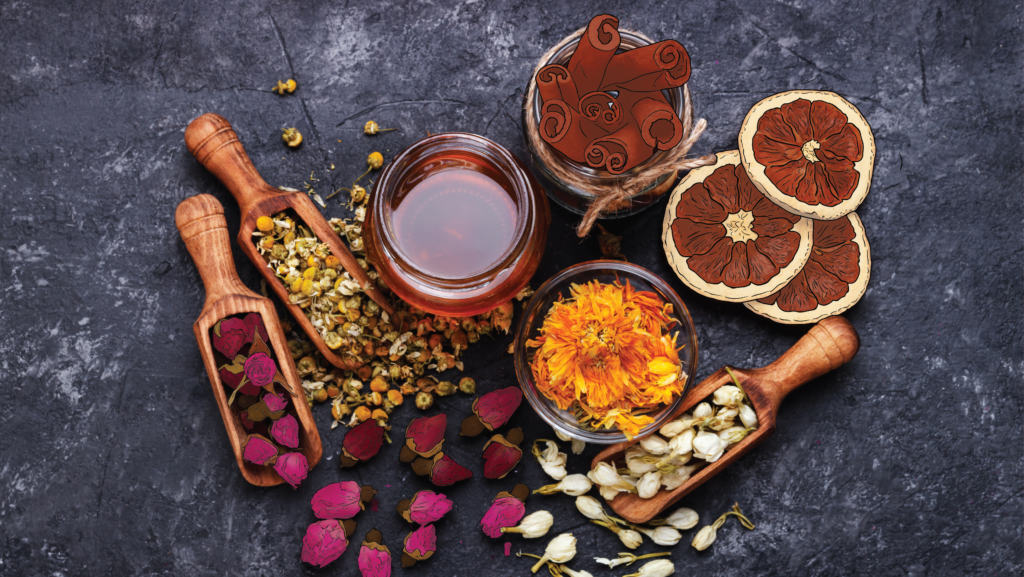
Chyawanprash is a highly nutritive and potent source of immune-boosting vitamins and antioxidants that has been used for thousands of years to promote longevity and vitality. A blend of many different powerful active ingredients, this medicinal jam could be considered a one-stop-shop for accessing a wide range of beneficial herbs that are particularly supportive during the transition to the colder months when the bodily systems become more prone to imbalance and illness.
What is Chyawanprash?
Chyawanprash is a delicious and highly medicinal ayurvedic jam preparation designed as a rejuvenative. In Sanskrit, prash refers to specially prepared food. The jam was first prepared by two ancient Ayurvedic sages to restore youth to the very elderly sage Chyavana — hence the name Chyawanprash. Jams are commonly used in Ayurveda as an anupan (carrier) for herbs, making them easier to digest and assimilate. But certain jams, such as chyawanprash, are medicinal in their own right.
The base of chyawanprash is amalaki — a fruit renowned for being rich in antioxidants and high levels of vitamin C. The rest of the chyawanprash is made up by a number of other herbs (sometimes up to twenty-five varieties) and ghee, sesame oil, honey and/or natural sugar. The ghee, oil and honey act as carriers, aiding the passage of medicinal herbs to the deeper tissues, whilst the sugar acts as a preservative.
The first known recipe for chyawanprash can be found in the Charaka Samhita, an ancient Ayurvedic text. However many other ancient references exist, often with minor differences or alterations to the original recipe. There is much historical evidence for the appropriate alteration of chyawanprash recipes. This being the case, there are a number of preparations that are considered legitimate within contemporary Ayurvedic herbology.
Health Benefits
- Builds ojas to promote a strong immune system and encourage youthfulness
- Rejuvenates the bodily tissues
- Supports the nervous system
- Increases overall strength, vitality and energy
- Kindles agni (the digestive fire)
- Supports the heart and respiratory system
- Tonifies the muscles and promotes muscle mass
- Supports urinary and reproductive health
When to Take Chyawanprash
Chyawanprash is a very useful blend for supporting the body through seasonal transitions. It is particularly appropriate during the winter months when it boosts the immune system and strengthens against illness or symptoms of seasonal imbalance. Alternatively, chyawanprash can be used on a more long-term basis for those recovering from illness or who are under high stress and require more support for overall strength and immunity.
Chyawanprash is a rasayana (rejuvenative) and therefore should typically be taken first thing in the morning to support the body throughout the day. It can also be taken a second time in the evening.
How to Use It
Chyawanprash is purely for internal use. Ayurveda recommends consuming herbs where possible and appropriate (versus external application), as they become more accessible to the body once they have made contact with the digestive tract.
Chyawanprash can be taken on its own, simply eaten straight from the jar with a spoon, or it can be stirred into warm water or milk, or used like a regular jam and spread onto bread or crackers. I personally love the flavour of chyawanprash stirred into warm milk. Taking it with milk has the added benefit of aiding the passage of the rejuvenating medicine to the deep tissues.
It is usually suggested to take 1 -2 teaspoons of chyawanprash once or twice a day, or as recommended by your practitioner.
Contraindications
There are very little known side-effects of chyawanprash, however if you have an allergy to amla (Emblica Officinalis) or any plants in the Phyllanthus family then it is best avoided. People with dominant pitta dosha may find chyawanprash excessively heating during the warmer months, which may cause symptoms such as indigestion or diarrhea.
If you are taking prescription medication or dealing with any specific symptomatology it is important to consult your doctor before adding chyawanprash, or any other herb, to your regimen.